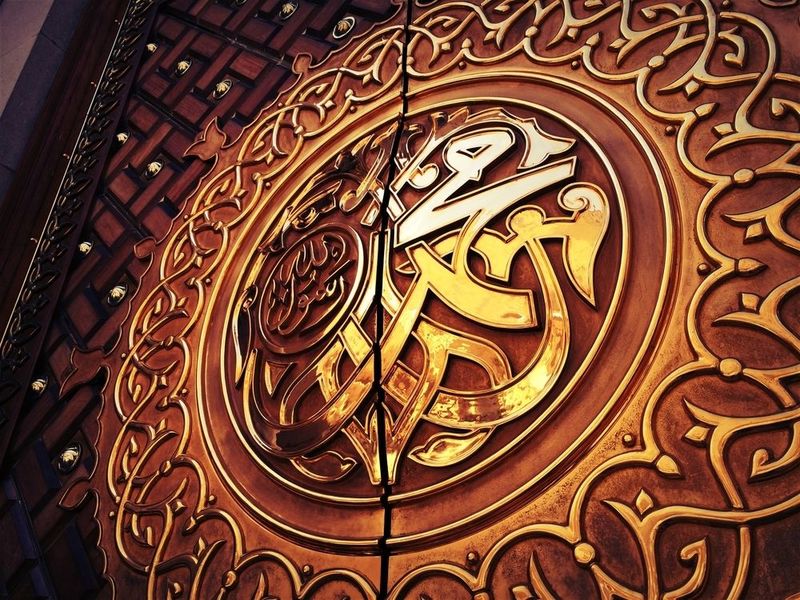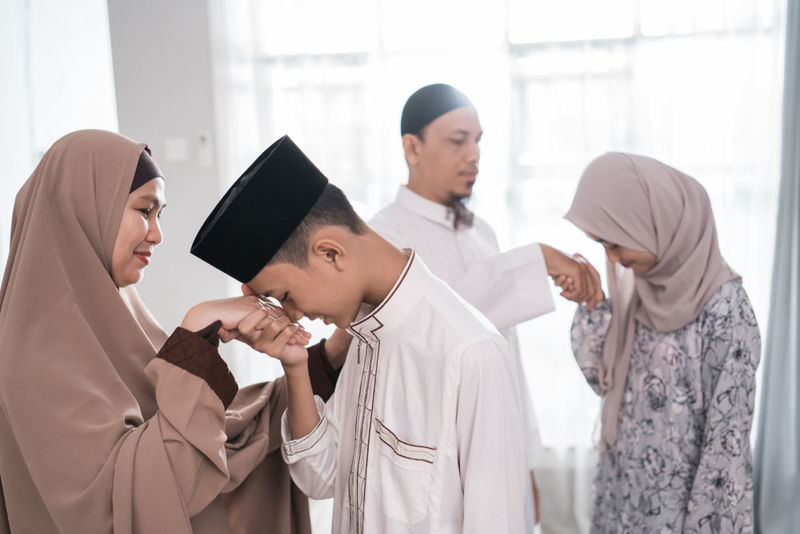The Significance and Merits of Adab
The Importance of Adab in Islam
Meaning and Significance of Adab
The word 'Adab' is commonly understood as the Islamic etiquette of having good manners and character. Prophet Muhammad s.a.w. is known to be a person of the best etiquette and moral values concerning his relationships with Allah s.w.t, himself and others. There are many instances from historical accounts where Prophet Muhammad s.a.w showed excellence in character. When the Prophet’s wife Aisyah r.a described the etiquette of her beloved husband, she said,
“His character was the Quran”.
(Sahih Muslim)
In the Quran, Allah s.w.t. described the Prophet s.a.w.:
,وَإِنَّكَ لَعَلَىٰ خُلُقٍ عَظِيمٍ”
And you are truly an excellent standard of character.
Surah Al-Qalam(68:4)
In one of the hadiths, the Prophet mentioned that one of the main purposes for his appointment as a prophet is to perfect the moral character of the people. Prophet Muhammad s.a.w said:
“I was sent to perfect good character.”
(Sahih Muslim)
The Prophet s.a.w also said:
“The most perfect/complete believers in faith is he who is the best of them in manners.”
(Sunan At-Tirmizi)
By referring to the contents of the Quran and sayings of the Prophet s.a.w on Adab or good character, we will find that morality is highly regarded in Islam. This also shows that morality is deeply rooted in the principles of faith. The Islamic moral system encompasses every aspect of life, including one’s affairs and relationship with the self, others and ultimately with The Creator. Therefore, having good morals will benefit us in ways that strengthen our faith.
In the discussion of having good manners, people tend to focus more on their dealings with others. However, I would like to firstly emphasise the Adab with The Creator, as the basis of our manners before proceeding to the other aspects of manners.
Imam Al-Ghazali rahimahullah (May God Bless Him) mentioned about observing Adab in our conduct with Allah s.w.t in his book ‘The Beginning of Guidance’, stressing the point that Adab towards Allah means to refrain ourselves from any disobedience in our actions and sayings:
“Know that your disobedience against Allah s.w.t with your physical body, while it is a bounty from Allah and a trust to you, and using it to disobey Him is the ultimate ingratitude. And your betrayal of Him entrusting you (with your physical body) that he has placed on you is the ultimate transgression. Indeed, the parts of your body are your subjects, so pay attention to how you govern them.”
Allah s.w.t has reminded us in many instances within the Quran about how humans will be held accountable for how we make use of the capabilities that Allah s.w.t bestowed us with. In Surah An-Nur, verse 24 Allah s.w.t mentioned:
يَوۡمَ تَشهَدُ عَلَيهِمۡ أَلۡسِنَتُهُمۡ وَأَيۡدِيهِمۡ وَأَرۡجُلُهُم بِمَا كَانُواْ يَعۡمَلُونَ
“On the day when their tongues and their hands and their feet testify against them as to what they used to do.”
(Surah An-Nur: 24)
Imam Al-Ghazali also mentioned some forms of Adab of a servant towards his/her Creator:
- Hastening to fulfill His commands and abstaining from His prohibitions
- Constant remembrance of Him
- Contemplate on His decree
Therefore, emulating prophetic manners, obeying Allah’s commands and abstaining from His prohibitions will make us among the recipients of Allah’s mercy as stated in the Quran:
وَأَطِيعُواْ ٱللَّهَ وَٱلرَّسُولَ لَعَلَّكُمْ تُرۡحَمُونَ
“And obey Allah and the Messenger that you may obtain mercy.”
(Surah Al-Imran: 132)
Benefits of Having Adab (Good Character)
To understand further the significance and merits of Adab is to ask ourselves how is Adab important and how can we benefit from having good character in our conduct? The merits of those who beautifully adhere to Adab are as follows:
1. Beloved by the Prophet Muhammad s.a.w

Whosoever strives in the way of emulating the sunnah of the Prophet s.a.w. will be rewarded with his love. The Prophet s.a.w said:
“Shall I tell you about the most beloved to me and the closest to my assembly on the Day of Resurrection?” They were silent, so the Prophet s.a.w repeated himself twice or thrice. They said, “Yes, O Messenger of Allah.” The Prophet s.a.w then said, “Those with the best character.”
(Hadith by Imam Ahmad)
It is known that the Prophet s.a.w assumed multiple roles and responsibilities in his lifetime. Aside from being a Prophet, he was as shepherd during his young age, he was a husband to Sayyidatina Khadijah r.a, a leader of the community in Madinah, a judge, a friend to his companions and a neighbour to people of diverse faiths, just to name a few. We can learn a lot just by looking into the conduct of the Prophet s.a.w in executing his roles and responsibilities.
Indeed, the Prophet has observed and upheld Adab or good character in his roles and responsibilities. Syed Naquib Al-Attas defines Adab as the “acquisition of the good qualities and attributes of mind and soul", which is what the Prophet acquired and exercised in his interactions with his Creator, himself and others.
2. Receive Allah’s Love and Forgiveness

We should always strive to emulate the good attributes of the Prophet s.a.w. Allah s.w.t. has commanded us to follow the sunnah of the Prophet s.a.w in the Quran which states:
قُلۡ إِن كُنتُمۡ تُحِبُّونَ ٱللَّهَ فَٱتَّبِعُونِى يُحۡبِبۡكُمُ ٱللَّهُ وَيَغۡفِرۡ لَكُمۡ ذُنُوبَكُمۡۗ وَٱللَّهُ غَفُورٌ۬ رَّحِيمٌ۬
Say, [O Muhammad], "If you should love Allah, then follow me, [so] Allah will love you and forgive you your sins. And Allah is Forgiving and Merciful."
(Surah Al-Imran; 31)
Allah the Almighty has linked his love and mercy with the Sunnah of the Prophet. So, whosoever loves Allah and wants to be loved and granted mercy by Allah, he/she then should internalise and emulate Prophetic mannerisms in his/her interactions with the self, others and ultimately Allah s.w.t.
3. Preserve good relationships with others.

Maintaining Adab towards Allah does not permit the abandonment of Adab towards other people around us. Some Muslims tend to focus solely on their piety to a point they neglect their relationship with others or perhaps they only care for fellow Muslims. However, having Adab towards Allah would make us realise how we must interact with family, friends, the larger community and even the environment.
Syed Naquib Al-Attas reminds us that a disciplined person is sincerely conscious of his responsibilities towards Allah and comprehends and performs his obligations to the self and to society. I strongly believe that religiosity takes into consideration of our relationship with society. Human dignity is shared among all human beings, neither limiting to the self nor to just Muslims.
Emulating the Prophet s.a.w in his Adab or good character when dealing with others should lead to social cohesion. There are no limitations set by this hadith that suggest that we should only maintain Adab towards fellow believers. Instead, Adab should also be extended to all.
In addition, scholars such as Imam Al-Ghazali and Imam Abdullah Alwi Al-Haddad have mentioned about the etiquettes in the form of duties and responsibilities to parents, relatives, friends and neighbours, Muslims and non-Muslims alike.
The Prophet s.a.w says in his hadith that translates:
"The best of companions to Allah is the one who is best to his companions, and the best of neighbours to Allah is the one who is the best of them to his neighbour."
(Sunan At-Tirmizi)
A hindrance to having good character towards others is the disease of envy and hatred towards themselves.
Allah s.w.t. says in the Quran:
يَـٰٓأَيّها ٱلنَّاسُ إِنَّا خَلَقۡنَـٰكُم مِّن ذَكَرٍ۬ وَأُنثَىٰ وَجَعَلۡنَـٰكُمۡ شُعُوبً۬ا وَقَبَآٮِٕلَ لِتَعَارَفُوٓاْۚ
“O mankind, indeed, We have created you from male and female and made you peoples and tribes that you may know one another.”
(Al-Hujurat: 13)
From the verse, Allah s.w.t has intended from his creations to be different in many ways for the sole purpose of understanding one another, preserve good relationships and not to hate and be jealous of one another. Prophet Muhammad s.a.w said:
"The disease of the past communities has crept up on you: Envy and hatred, truly it is a razor. I do not speak of what cuts the hair, but what severs the religion. By the One in Whose Hand is my soul! You will not enter Paradise until you believe, and you will not believe until you love one another. Shall I not inform you of that which enables you to attain this? Spread peace among yourselves."
(Sunan At-Tirmizi)
And Allah knows best.


